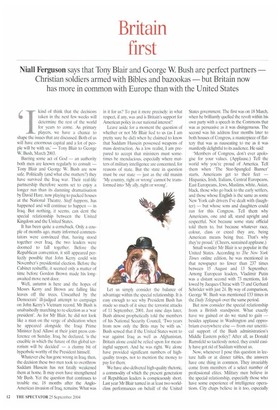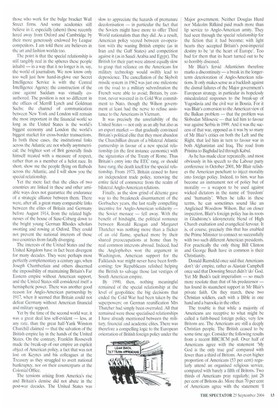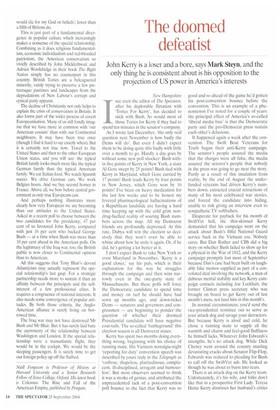Britain first
Niall Ferguson says that Tony Blair and George W. Bush are perfect partners — Christian soldiers armed with Bibles and bazookas but Britain now has more in common with Europe than with the United States
kind of think that the decisions taken in the next few weeks will determine the rest of the world for years to come. As primary players, we have a chance to shape the issues that are discussed. Both of us will have enormous capital and a lot of people will be with us. — Tony Blair to George W. Bush, March 2003.
Barring some act of God an authority both men are known regularly to consult — Tony Blair and George W. Bush are now safe. Politically (and what else matters?) they have survived the Iraq war. Their real-life partnership therefore seems set to enjoy a longer run than its damning dramatisation by David Hare, now playing to packed houses at the National Theatre. Stuff happens, has happened and will continue to happen in Iraq. But nothing, it seems, can dent the special relationship between the United Kingdom and the United States.
It has been quite a comeback. Only a couple of months ago, many informed commentators were convinced that, having stood together over Iraq, the two leaders were doomed to fall together. Before the Republican convention, it still appeared perfectly possible that John Kerry could win November's presidential election. Before the Cabinet reshuffle, it seemed only a matter of time before Gordon Brown made his longawaited move next door.
Well, autumn is here and the hopes of Messrs Kerry and Brown are falling like leaves off the trees. Unscathed by the Democrats' ill-judged attempt to campaign on John Kerry's Vietnam record, Mr Bush is unabashedly marching to re-election as a 'war president'. As for Mr Blair, he did not look like a man on the verge of abdication when he appeared alongside the Iraqi Prime Minister Iyad Allawi at their joint press conference on Sunday. Iraq, he declared, 'is the crucible in which the future of this global terrorism will be decided' — a clumsy bit of hyperbole worthy of the President himself.
Whatever else has gone wrong in Iraq, then, the decision these two men took to overthrow Saddam Hussein has not fatally weakened them at home. It may even have strengthened Mr Bush. Yet the question that continues to trouble me, 18 months after the AngloAmerican invasion of Iraq, remains: What was
in it for us? To put it more precisely: in what respect, if any, was and is Britain's support for American policy in our national interest?
Leave aside for a moment the question of whether or not Mr Blair lied to us (as I am pretty sure he did) when he claimed to know that Saddam Hussein possessed weapons of mass destruction. As a low realist, I am prepared to accept that ministers must sometimes be mendacious, especially where matters of military intelligence are concerned, for reasons of state. But the state in question must be our state — just as the old maxim 'My country, right or wrong' cannot be transformed into 'My ally, right or wrong'.
Let us simply consider the balance of advantage within the special relationship. It is easy enough to see why President Bush has made so much of it since the terrorist attacks of 11 September, 2001. Just nine days later, Bush almost prophetically told the members of his National Security Council, 'Two years from now only the Brits may be with us.' Bush sensed that if the United States went to war against Iraq as well as Afghanistan. Britain alone could be relied upon for meaningful support. And he was right. We alone have provided significant numbers of highquality troops, not to mention the money to pay for them.
We have also delivered high-quality rhetoric, a commodity of which the present generation of Republican leaders is conspicuously short. Last year Mr Blair turned in at least two worldclass performances on behalf of the United
States government. The first was on 18 March, when he brilliantly quelled the revolt within his own party with a speech in the Commons that was as persuasive as it was disingenuous. The second was his address four months later to both houses of Congress, a masterpiece of flattery that was as nauseating to me as it was manifestly delightful to its audience. He said:
'Members of Congress, don't ever apologise for your values. (Applause.) Tell the world why you're proud of America. Tell them when 'The Star-Spangled Banner' starts. Americans get to their feet — Hispanics, Irish, Italians, Central Europeans, East Europeans, Jews, Muslims, white, Asian, black, those who go back to the early settlers, and those whose English is the same as some New York cab drivers I've dealt with (laughter) — but whose sons and daughters could run for this Congress. Tell them why Americans, one and all, stand upright and respectful. Not because some state official told them to, but because whatever race, colour, class or creed they are, being American means being free. That's why they're proud.' (Cheers, sustained applause.) Small wonder Mr Blair is so popular in the United States. According to The New York Times online edition, he was mentioned in that newspaper no fewer than 237 times between 15 August and 13 September. Among European leaders, Vladimir Putin was a distant second with 73 mentions, followed by Jacques Chirac with 73 and Gerhard Schroder with just 24. By way of comparison, George W. Bush was mentioned 133 times in the Daily Telegraph over the same period.
But now consider the special relationship from a British standpoint. What exactly have we gained or do we stand to gain besides applause in Washington and opprobrium everywhere else — from our uncritical support of the Bush administration's Middle Eastern policy? After all, as Donald Rumsfeld so tactlessly noted, they could easily have got rid of Saddam without us.
Now, whenever I pose this question in lecture halls or at dinner tables, the answers have one thing in common. They invariably come from members of a select number of professional elites. Military men believe in the special relationship, especially those who have some experience of intelligence operations. City chaps believe in it too, especially those who work for the bulge bracket Wall Street firms. And some academics still believe in it, especially (ahem) those recently lured away from Oxford and Cambridge by their more generously endowed Ivy League competitors. I am told there are believers in the art and fashion worlds too.
The point is that the special relationship is still tangibly real in the spheres these people inhabit — in a way that it no longer is in, say, the world of journalism. We now know only too well just how hand-in-glove our Secret Intelligence Service is with the Central Intelligence Agency; the construction of the case against Saddam was virtually coauthored. The position is not so different in the offices of Merrill Lynch and Goldman Sachs; the channel of communication between New York and London will remain the most important in the financial world so long as the United States is the world's biggest economy and London the world's biggest market for cross-border transactions. In both these cases, the institutional links across the Atlantic are not wholly asymmetrical; the brighter sort of Brit generally finds himself treated with a measure of respect, rather than as a member of a helot race. In short, show me the people flying on flatbeds across the Atlantic, and I will show you the special relationship.
Yet the mere fact that the elites of two countries are linked in these and other amiable ways does not guarantee the endurance of a strategic alliance between them. There were, after all, a great many comparable links between the elites of Britain and Germany before August 1914, from the related highnesses of the house of Saxe-Coburg down to the bright young German Rhodes scholars swotting and rowing at Oxford. They could not prevent the national interests of those two countries from fatally diverging.
The interests of the United States and the United Kingdom have in fact been divergent for many decades. They were perhaps most perfectly complementary a century ago, when Joseph Chamberlain and others discerned the impossibility of maintaining Britain's Far Eastern empire without American support, and the United States still considered itself a hemispheric power. There was another good reason for Anglo-American partnership by 1917, when it seemed that Britain could not defeat Germany without American financial and military support.
Yet by the time of the second world war, it was a great deal less self-evident — less, at any rate, than the great half-Yank Winston Churchill claimed — that the salvation of the British empire lay in the hands of the United States. On the contrary, Franklin Roosevelt made the break-up of our empire an explicit object of American policy, a fact that was not lost on Keynes and his colleagues at the Treasury as they struggled to avert national bankruptcy, nor on their counterparts at the Colonial Office.
The tensions arising from America's rise and Britain's demise did not abate in the post-war decades. The United States was slow to appreciate the hazards of premature decolonisation — in particular the fact that the Soviets might have more to offer Third World nationalists than they did. As a result, American policy veered between co-operation with the waning British empire (as in Iran and the Gulf States) and competition against it (as in Saudi Arabia and Egypt). The British for their part were almost equally slow to grasp that reliance on the Americans for military technology would swiftly lead to dependence. The cancellation of the Skybolt missile system in 1962 was just one milestone on the road to a military subordination the French were able to avoid; Britain, by contrast, never wavered in its Cold War commitment to Nato, though the Wilson government at least had the nerve to refuse assistance to the Americans in Vietnam.
It was precisely the unreliability of the United States — not only as an ally but also as an export market — that gradually convinced Britain's political elite that they must abandon the Churchillian dream of a bilateral Atlantic partnership in favour of a new special relationship (in the first instance economic) with the signatories of the Treaty of Rome. Thus Britain's entry into the EEC rang, or should have rung, the death knell for the special relationship. From 1973, Britain ceased to have an independent trade policy, removing the entire field of commerce from the realm of bilateral Anglo-American relations.
Finally, as the slow grind of détente gave way to the breakneck disarmament of the Gorbachev years, the last really compelling incentive for Anglo-American solidarity — the Soviet menace — fell away. With the benefit of hindsight, the political romance between Ronald Reagan and Margaret Thatcher was nothing more than a flicker of an old flame, sparked more by their shared preoccupations at home than by real common interests abroad. Indeed, had the Anglophobes won the argument in Washington, American support for the Falklands war might never have been forthcoming; few Republicans relished helping the British to salvage those last vestiges of South American empire.
By 1990, then, nothing meaningful remained of the special relationship at the level of geopolitics; the big decisions that ended the Cold War had been taken by the superpowers; on German reunification Mrs Thatcher had simply been overruled. All that remained were those specialised relationships I have already mentioned between the military, financial and academic elites. There was therefore a compelling logic to the European orientation of British foreign policy under the Major government. Neither Douglas Hurd nor Malcolm Rifkind paid much more than lip service to Anglo-American amity. They had seen through the special relationship for the fiction that it had become: with light hearts they accepted Britain's post-imperial destiny to be 'at the heart of Europe'. Too bad for them that its heart turned out to be so horribly diseased.
Mr Blair's fervid Atlanticism therefore marks a discontinuity — a break in the longerterm deterioration of Anglo-American relations. It only makes sense as a backlash against the dismal failures of the Major government's European strategy, in particular its hopelessly miscalculated responses to the break-up of Yugoslavia and the civil war in Bosnia. For it was Blair's conversion to the American view of the Balkan problem — that the problem was Slobodan Milosevic — that led him to favour war against Serbia in 1999. And it was the success of that war, opposed as it was by so many of Mr Blair's critics on both the Left and the Right, that led him in turn to favour war in both Afghanistan and Iraq. The road from Pristina to Baghdad led through Kabul.
As he has made clear repeatedly, and most obviously in his speech to the Labour party conference in October 2001, Mr Blair relishes the American penchant to inject morality into foreign policy. Indeed, to hint war has become an instrument not of policy but of morality — a weapon to be used against wicked dictators in the name of 'freedom' and 'humanity'. When he talks in these terms, he can sometimes sound like an Anglicised Woodrow Wilson. But on closer inspection, Blair's foreign policy has its roots in Gladstone's idiosyncratic blend of High Church exaltation and evangelical fervour. It is, of course, precisely this that has enabled the Prime Minister to connect so successfully with two such different American presidents. For practically the only thing Bill Clinton and George Bush have in common is their Christianity.
Donald Rumsfeld once said that Americans don't 'do' empire, rather as Alastair Campbell once said that Downing Street didn't 'do' God. Yet Mr Bush's tacit imperialism — so much more resolute than that of his predecessor — has found its staunchest support in Mr Blair's private faith. On they march, these two Christian soldiers, each with a Bible in one hand and a bazooka in the other.
The trouble is that while a majority of Americans are receptive to what might be called a faith-based foreign policy, very few Britons are. The Americans are still a deeply Christian people. The British ceased to be some time ago. Consider the following results from a recent BBOICM poll. Over half of Americans agree with the statement 'My God is the only true god' compared with fewer than a third of Britons. An even higher proportion of Americans (53 per cent) regularly attend an organised religious service, compared with barely a fifth of Britons. Two thirds of Americans pray regularly; just 28 per cent of Britons do. More than 70 per cent of Americans agree with the statement 'I would die for my God or beliefs'; fewer than a fifth of Britons do.
This is just part of a fundamental divergence in popular culture which increasingly makes a nonsense of the special relationship. Combining as it does religious fundamentalism, economic individualism and red-blooded patriotism, the American conservatism so vividly described by John Micklethwait and Adrian Wooldridge in their hook The Right Nation simply has no counterpart in this country. British Tories are a beleaguered minority, vainly trying to preserve a few picturesque pastimes and landscapes from the depredations of New Labour's corrupt and cynical party apparat.
The decline of Christianity not only helps to explain the crisis of conservatism in Britain. It also forms part of the wider process of covert Europeanisation. Many of us still fondly imagine that we have more in common with 'our American cousins' than with our Continental neighbours. It may have been true once (though I find it hard to say exactly when). But it is certainly not true now. Travel to the United States and then to the other European Union states, and you will see: the typical British family looks much more like the typical German family than the typical American family. We eat Italian food. We watch Spanish soccer, We drive German cars. We work Belgian hours. And we buy second homes in France. Above all, we bow before central government as only true Europeans can.
And perhaps nothing illustrates more clearly how very European we are becoming than our attitudes to the United States. Asked in a recent poll to choose between the two candidates for the presidency, 47 per cent of us favoured John Kerry, compared with just 16 per cent who backed George Bush — at a time when Bush was more than 10 per cent ahead in the American polls. On the legitimacy of the Iraq war, too, the British public is now closer to Continental opinion than to American.
All this suggests that Tony Blair's devout Atlanticism may actually represent the special relationship's last gasp. For a strategic partnership needs more to sustain it than an affinity between the principals and the selfinterest of a few professional elites. It requires a congruence of national interests. It also needs some convergence of popular attitudes. By both those criteria, the AngloAmerican alliance is surely living on borrowed time.
The Iraq war may not have destroyed Mr Bush and Mr Blair. But it has surely laid bare the asymmetry of the relationship between Washington and London. If the special relationship were a transatlantic flight, they would be in the cockpit. We would be the sleeping passengers. It is surely time to get our foreign policy up off the flatbed.
Niall Ferguson is Professor of History at Harvard University and a Senior Research Fellow of Jesus College, Oxford. His latest book is Colossus: The Rise and Fall of the American Empire, published by Penguin.




























































































 Previous page
Previous page